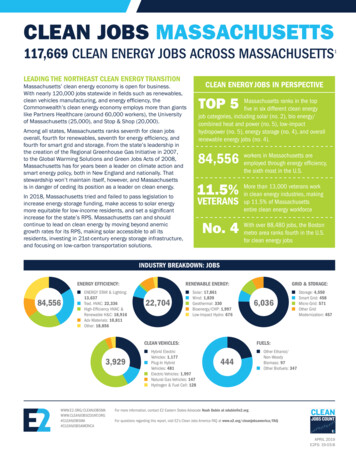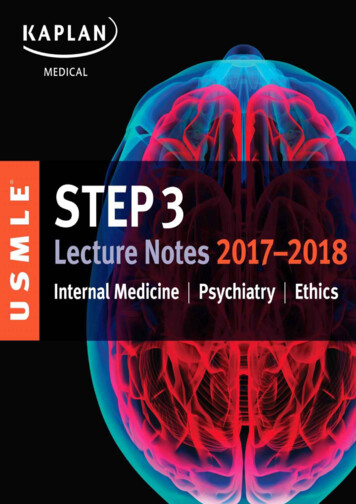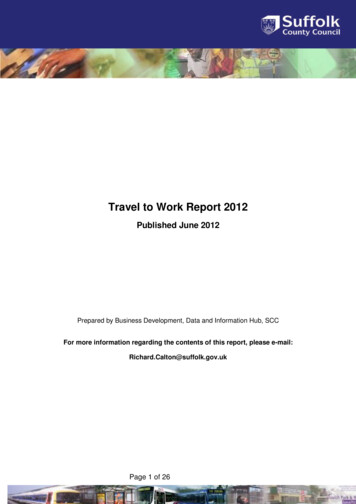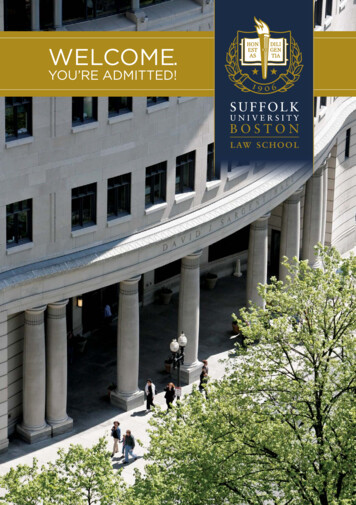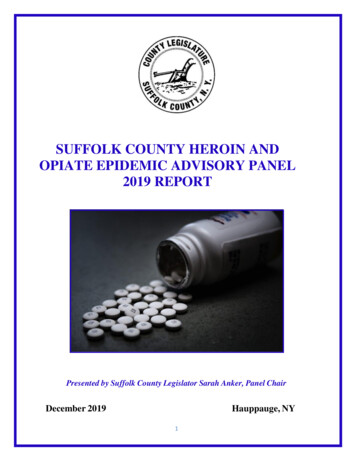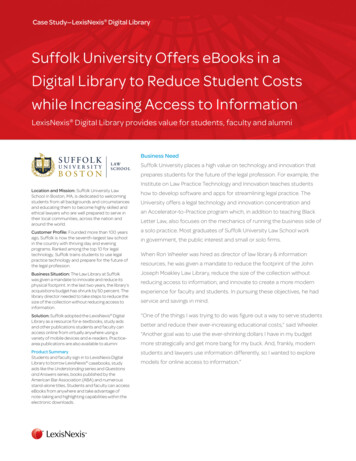
Transcription
Case Study —LexisNexis Digital LibrarySuffolk University Offers eBooks in aDigital Library to Reduce Student Costswhile Increasing Access to InformationLexisNexis Digital Library provides value for students, faculty and alumniBusiness NeedSuffolk University places a high value on technology and innovation thatprepares students for the future of the legal profession. For example, theInstitute on Law Practice Technology and Innovation teaches studentsLocation and Mission: Suffolk University LawSchool in Boston, MA, is dedicated to welcomingstudents from all backgrounds and circumstancesand educating them to become highly skilled andethical lawyers who are well prepared to serve intheir local communities, across the nation andaround the world.how to develop software and apps for streamlining legal practice. TheUniversity offers a legal technology and innovation concentration andan Accelerator-to-Practice program which, in addition to teaching BlackLetter Law, also focuses on the mechanics of running the business side ofCustomer Profile: Founded more than 100 yearsago, Suffolk is now the seventh-largest law schoolin the country with thriving day and eveningprograms. Ranked among the top 10 for legaltechnology, Suffolk trains students to use legalpractice technology and prepare for the future ofthe legal profession.a solo practice. Most graduates of Suffolk University Law School workBusiness Situation: The Law Library at Suffolkwas given a mandate to innovate and reduce itsphysical footprint. In the last two years, the library’sacquisitions budget has shrunk by 50 percent. Thelibrary director needed to take steps to reduce thesize of the collection without reducing access toinformation.Joseph Moakley Law Library, reduce the size of the collection withoutSolution: Suffolk adopted the LexisNexis DigitalLibrary as a resource for e-textbooks, study aidsand other publications students and faculty canaccess online from virtually anywhere using avariety of mobile devices and e-readers. Practicearea publications are also available to alumni“One of the things I was trying to do was figure out a way to serve studentsProduct SummaryStudents and faculty sign in to LexisNexis DigitalLibrary to borrow LexisNexis casebooks, studyaids like the Understanding series and Questionsand Answers series, books published by theAmerican Bar Association (ABA) and numerousstand-alone titles. Students and faculty can accesseBooks from anywhere and take advantage ofnote-taking and highlighting capabilities within theelectronic downloads.students and lawyers use information differently, so I wanted to explorein government, the public interest and small or solo firms.When Ron Wheeler was hired as director of law library & informationresources, he was given a mandate to reduce the footprint of the Johnreducing access to information, and innovate to create a more modernexperience for faculty and students. In pursuing these objectives, he hadservice and savings in mind.better and reduce their ever-increasing educational costs,” said Wheeler.“Another goal was to use the ever-shrinking dollars I have in my budgetmore strategically and get more bang for my buck. And, frankly, modernmodels for online access to information.”
Going beyond its physical research and study areas, Suffolk University’s LawLibrary is innovating to offer more online options for access from anywhere.Setting the Stage for ChangeWheeler, an associate professor of legal research, was also focusing on theidea that library services transcend the walls of the law school. “Studentsshould feel like they have access to a librarian when they’re on the train orwhen they’re at home, not just when they walk through the library and passthe reference desk.” At Suffolk, librarians now carry Apple iPad devicesaround the Law School building—going beyond the physical library. Theymake eye contact with students and offer to help with their informationneeds. When students are in the cafeteria, for example, they can asklibrarians a reference question.2
“I’ve always thought that in modern libraries we do ourselves a disservice ifwe aren’t meeting people where they are. One thing we know is that studentsare online. If we can meet them online, that’s where we can capture them.Our librarians tweet, and we have a Suffolk Facebook page. But what I reallywanted to stress to students is that they have access online to trained lawschool librarians, and they can take advantage of that without walking intothe library. One way to drive that home is to have librarians walking aroundwith devices demonstrating to students that we engage with information the“I wanted to finda solution wherestudents could readsame way they do.”Taking that approach a step further, Wheeler sought to give studentsaccess to study aid material from anywhere. Without a digital option,even students working across the hall from the library could not accessstudy aids—those were on reserve and had to be checked out for up to threetheir course reservehours without being removed from the library. “That made no sense to mematerials on the traintheir course reserve materials on the train or at lunchtime at the law firmor at lunchtime at thethe technology to provide those remote resources, it was time to just do it.”law firm where theyat all,” says Wheeler. “I wanted to find a solution where students could readwhere they work or while they’re on the beach at the Cape. Since we haveShortly after starting his role at Suffolk, Wheeler also began spendingtime with local law firm librarians. “My experience has been that law firmwork or while they’relibraries tend to be 5 – 10 years ahead of academic libraries. So I went toon the beach at thetalking about the LexisNexis Digital Library solution. A couple of the lawCape. Since we havethe technology toprovide those remoteresources, it was timean Association of Boston Law Librarians (ABLL) meeting and they werefirms had it and they talked about how much the attorneys really liked it.”While all these developments were under way, Wheeler’s LexisNexisrepresentative asked him if the LexisNexis Digital Library would be suitedto his needs.“It was like a convergence of all these things happening at once,” saysWheeler. “The LexisNexis Digital Library Solution really made sense as a wayto solve some of our problems and make changes in line with my mandate.”to just do it.”—Ron Wheeler, Director of Law Library& Information Resources,Suffolk University Law School3
Solution DetailsLexisNexis Digital Library gives students and faculty access toauthoritative legal eBook content on a variety of major mobile devicesand desktop platforms. Right now the subscription includes more than2,000 volumes, including full-text LexisNexis casebooks, study aids likethe Understanding series and Questions and Answers series, bookspublished by the American Bar Association (ABA) and numerousstand-alone titles.“I wanted to get the textbooks and study aids available in the DigitalLibrary,” says Wheeler, “but I also wanted to make sure we had a practiceoriented set in all the major practice areas so I could market this to alumni.We have titles for a wide range of practice areas.”The solution is provided through a combined offering from LexisNexisand OverDrive, the digital library solutions provider chosen by 25,000 libraries, schools and colleges worldwide. Law students and faculty canborrow eBooks to read using a browser on their computer, tablets orsmartphones—or they can use eReader apps like the Amazon Kindle or OverDrive app.The University uses this offering to share eBook titles among multipleusers, purchase eBooks centrally and manage its eBooks library efficientlyvia one central, electronic platform.Patrons sign in to browse or search for content. After selecting a title theycan read the book in their browser or (for most eBooks) download anEPUB or Kindle version. When reading the book in a browser, users can alsodownload a copy for offline use. They can highlight text and create notes,which are synced to their account so that they can be accessed again froma different machine.This sign-in screen gives Suffolk law students and faculty easy accessto the LexisNexis Digital Library.4
“I know for surethere are studentswho prefer to haveLexisNexis eBooks include active links from citation references tostatutes, cases, treatises and other materials via the Lexis Advance research solution. This fosters a seamless transition from book research toonline resources.Textbooks for law students are very expensive. Suffolk University Lawa physical book inSchool estimates that full-time students spend 1,250/year and part-their hands, but evenarranged his budget and program in such a way that, for classes wherethose students haveavailable to students at no extra charge.told me, ‘When I’mtime students spend 920/year on textbooks. With that in mind, WheelerSuffolk University professors are using LexisNexis e-textbooks, they areImplementation, Promotions and Trainingoff campus, I’mIn late 2014, Suffolk committed to two professors that e-textbooks wouldso happy to haveAfter an accelerated development process, the technology was in place.electronic access.’”“and the students didn’t have any problem once it was live signing in andbe available to their students before the start of the 2015 spring semester.“The process was far simpler than we thought it would be,” said Wheeler,checking materials out.”—Ron Wheeler, Director of Law Library& Information Resources,Suffolk University Law SchoolHow was the solution received? Wheeler realized that polling studentsabout the LexisNexis Digital Library before they saw it would not be afair test of its value. And when students saw it, they liked it. Faculty andstudents are increasingly embracing the Digital Library approach. “I knowfor sure there are students who prefer to have a physical book in theirhands, but even those students have told me, ‘When I’m off campus, I’mso happy to have electronic access.’”Suffolk has more than 80 full-time faculty members—some in support ofeBooks and some in favor of a more traditional approach. “There’s a smallbut vocal group of faculty members who are against having laptops in theclassroom and have been resistant to the use of electronic textbooks,”says Wheeler. “They have been voicing concerns about the use ofelectronic texts during exams, for example. But what’s been great is there’salso a less vocal but adamant group of early adopters who immediatelychose LexisNexis e-textbooks for their classes because it’s what studentswant and it saves them a little money.”5
“Being able toTo bring faculty onboard with the digital library, LexisNexis sponsored aaccess study aidsthe people who were a little skeptical. And it helped put those who werelike Understandinglunchtime training event. “That was great,” says Wheeler. “It helped informprone to early adoption over the edge.”During a student rollout event, LexisNexis staff was available in the libraryor Q&A anytime,with various electronic devices—Android devices, iPads, Microsoft anywhere withoutDigital Library solution using those devices. If they logged in to the digitalhaving to worry aboutthem being checkedout by anotherWindows tablets and a tabletop device. Students could engage with thelibrary at the event, they were entered in a drawing for an iPad.“My hope was to create a festive atmosphere, and I think we achieved that,”says Wheeler. “The number of students who signed in and checked outitems even the first day exceeded my expectations.”In addition, to help students easily access case books, a librarian wasstudent has made myassigned to each class where the professor had assigned a LexisNexislife less stressful.”those classes received special email instructions on accessing the e-texts—Suffolk UniversityLaw School Studentcasebook available in eBook format as part of the digital library. Students inand were encouraged to contact a librarian with any questions.Wheeler also arranged a training session for reference librarians, who nowkeep their iPads at the reference desk so they can instruct students onhow to access the Digital Library. In addition, non-librarians who work thecirculation desk and elsewhere in the library attended a Digital LibraryWebinar so they are aware of what’s available and how to access it.Within five months after launching LexisNexis DigitalLibrary, about 20 percent of prospective users had adoptedthe online resource, and 964 eBooks had been checked out.At this launch event, students explored the LexisNexis Digital Library usinga “device bar” in the library.6
“Particularly in theResultssnowstorms, accessthe past two years, Wheeler says, “Thanks to solutions like this, we haveto the eBook hasIf anything, it has expanded.”Despite the 50 percent decline in the library’s acquisition budget overnot reduced the amount of information our library users have access to.been an amazingWhat about Wheeler’s mandate to reduce the library’s footprint?resource. I recentlySeveral months after the launch of the LexisNexis Digital Library, Suffolkhad a massive flightpublications to decrease the library by an entire floor. This step was notdelay but thanks toThe library occupied floors 5 – 7 of the seven-story law school building.began condensing the library and eliminating seldom-used hardcovera result but a move parallel to the digital library adoption.the OverDrive app, Iwas able to prep forclass on my phone.”—Ragini N. Shah, Clinical Professor of Law& Director of Clinical Programs,Suffolk University Law SchoolThe library now occupies one floor less while offering more informationthan before.Suffolk expects to continue offering hard-copy books as well for theforeseeable future. “But we’ve been able to buy just one print copy of astudy aid or textbook instead of three or four previously,” says Wheeler.“That’s been huge. Reducing the number of copies we buy is a very bigdeal for us.”And for many students, the Digital Library means not just reducedspending on books but also better productivity. “What I hope is thatstudents become more productive because they are able to accessinformation in what would otherwise be down time,” says Wheeler.Here’s one Suffolk law student’s comment on that advantage: “Being ableto access study aids like Understanding or Q&A anytime, anywhere withouthaving to worry about them being checked out by another student hasmade my life less stressful.”7
“What we know isThe same advantage applies to professors. For example, Ragini N. Shah,that libraries areLexisNexis casebook available as an e-text for her immigration law class.not going to lookthis service that Ron and his team have negotiated for us. I adopted thethe same as theydo today in five or 10clinical professor of law and director of clinical programs, adopted aShe later emailed Wheeler and other colleagues to say, “I just want to plugLexis immigration text for the first time this year to both change to a moreproblem-based teaching method and save the students some money. Particularly in the snowstorms, access to the eBook has been an amazingresource. I recently had a massive flight delay but thanks to the overdriveyears. So we might asapp, I was able to prep for class on my phone.”well start trying theseHow has the digital library worked out overall? Says Wheeler, “I have foundnew things, takingand increasing access for students and faculty, getting students andrisks and seeingdeal. That’s an unintended consequence that’s been huge for me.”what happens. Ithink that’s whatwe’re supposedto be doing.”—Ron Wheeler, Director of Law Library& Information Resources,Suffolk University Law Schoolit extremely valuable in ways I did not anticipate. Beyond the cost savingsfaculty thinking about library resources and information delivery is a bigLooking AheadWheeler says the LexisNexis Digital Library has potential to help drawmore law students to Suffolk. “I think the fact that it has the potential tosave students some money at a time when legal education costs haveskyrocketed is in itself a big deal,” says Wheeler. “Coupled with all theinitiatives that Suffolk has launched to brand itself as the technologicallyforward-thinking law school, it’s bound to be attractive to a certain subsetof future law students.”Wheeler has several next steps in mind: Keep engaging the faculty. “I think some faculty can be persuaded toadopt e-textbooks,” he says, “so I want to push the envelope there.” Do another rollout event for students, especially incoming students forthe fall semester. “We’ll have about 300 incoming first-year students,”he notes, adding, “We may have another iPad event in the fall.” Continue connecting with alumni. “I have done a little informal focusgroup outreach with a couple of alumni and asked them about theDigital Library as an offering for alums,” says Wheeler. “I’m asking themwhat additional titles they would want in the Digital Library Solution.”8
Wheeler has developed additional perspective through his involvementwith the American Association of Law Librarians (AALL)—he’s preparing totake on the vice president/president-elect role. When he talks to colleaguesabout the future of law libraries, he tells them, “What we know is thatlibraries are not going to look the same as they do today in five or ten years.So we might as well start trying these new things, taking risks and seeingwhat happens. I think that’s what we’re supposed to be doing.” He adds,“The idea that we’re spending most of our huge budgets on print materialsis ridiculous to me. So we’ve got to try something new.”About Suffolk University Law SchoolSuffolk University Law School is a private law school located in downtownBoston, MA, and is the seventh-largest law school in the country. Rankedamong the top 10 for legal technology, Suffolk trains students to use legalpractice technology and prepare for the future of the legal profession.Suffolk also has top-ranked clinical, legal writing, dispute resolution andintellectual property programs.The opinions expressed within this article represent customer opinions.LexisNexis believes this case study experience generally represents theexperience found with other similar customer situations. However, eachcustomer will have its own subjective goals and requirements and willsubscribe to different combinations of LexisNexis services to suit thosespecific goals and requirements. This case study may not be deemed tocreate any warranty or representation that any other customer’s experiencewill be the same as the experience identified herein. LexisNexis uses thecustomer’s trademarks herein with the customer’s permission.About LexisNexis Legal & ProfessionalLexisNexis, Lexis, Nexis and the Knowledge Burst logo are registered trademarksof Reed Elsevier Properties Inc., used under license. OverDrive is a registeredtrademark of OverDrive, Inc. Other products or services may be trademarks orregistered trademarks of their respective companies. 2015 LexisNexis. All rights reserved. OFF03474-0 0715LexisNexis Legal & Professional (lexisnexis.com) is a leading globalprovider of content and technology solutions that enable professionalsin legal, corporate, tax, government, academic and non-profitorganizations to make informed decisions and achieve better businessoutcomes. As a digital pioneer, the company was the first to bring legaland business information online with its Lexis and Nexis services. Today,LexisNexis Legal & Professional harnesses leading-edge technologyand world-class content to help professionals work in faster, easier andmore effective ways. Through close collaboration with its customers,the company ensures organizations can leverage its solutions to reducerisk, improve productivity, increase profitability and grow their business.LexisNexis Legal & Professional, which serves customers in more than 175countries with 10,000 employees worldwide, is part of RELX Group plc, aworld-leading provider of information solutions for professional customersacross industries.9
Textbooks for law students are very expensive. Suffolk University Law School estimates that full-time students spend 1,250/year and part-time students spend 920/year on textbooks. With that in mind, Wheeler arranged his budget and program in such a way that, for classes where Suffolk University professors are using LexisNexis e-textbooks .
